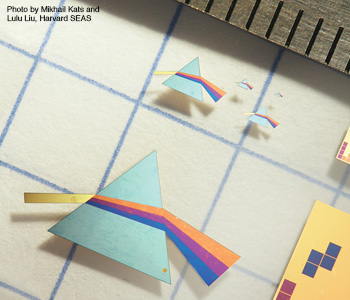Feature
Thin-Film Interference in Lossy, Ultra-Thin Layers
Although much thinner than conventional optical interference coatings, nanometer-thick films made of optically absorbing materials can display strong interference effects. This new class of coatings shows promise for coloring and labeling, optical filters, tunable absorbers and emitters, and energy harvesting.
 A collage of colorful films made of different thicknesses of germanium on top of gold using multi-step lithography.
A collage of colorful films made of different thicknesses of germanium on top of gold using multi-step lithography.
Thin-film interference is the ubiquitous optical phenomenon responsible for the colorful, iridescent reflections that we see in oil films on water, soap bubbles and peacock feathers. It occurs in structures composed of one or more transparent thin films, whose typical thickness is similar to the wavelength of light.
…Log in or become a member to view the full text of this article.
This article may be available for purchase via the search at Optica Publishing Group.
Optica Members get the full text of Optics & Photonics News, plus a variety of other member benefits.
